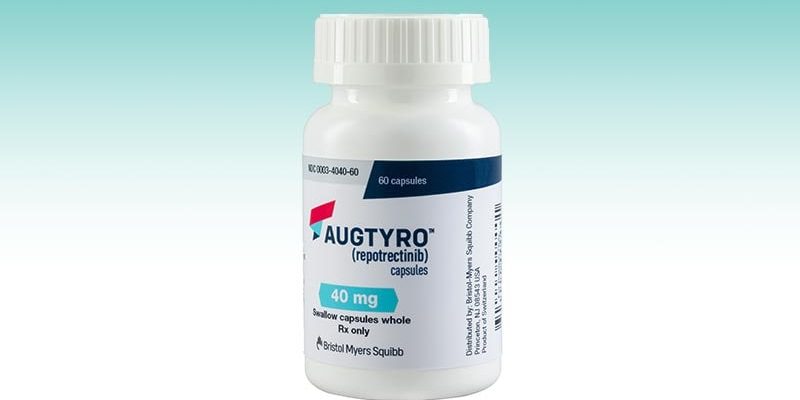FDA Approves Repotrectinib for ROS1-Positive NSCLC
The US Food and Drug Administration (FDA) has approved repotrectinib (Augtyro, Bristol Myers Squibb) for adults with locally advanced or metastatic ROS1-postive non–small cell lung cancer (NSCLC), a difficult-to-treat form of lung cancer, particularly in cases involving brain metastases.
The next-generation tyrosine kinase inhibitor (TKI) targets ROS1 oncogenic fusions and is designed to minimize interactions that can lead to treatment resistance.
The approval was based on the open-label, phase 1/2 single-arm TRIDENT-1 trial, which showed a high objective response rate and durable response among TKI-naive and TKI-pretreated patients.
“New treatment options continue to be needed for patients with ROS1 fusion-positive NSCLC that support important clinical goals, including achieving durable therapeutic responses,” primary investigator Jessica J. Lin, MD, said in a company press release. “Based on the data we have seen in the TRIDENT-1 trial, repotrectinib has the potential to become a new standard of care option for patients with locally advanced or metastatic ROS1 fusion-positive lung cancer.”
TRIDENT-1 evaluated the safety, tolerability, pharmacokinetics, and antitumor activity of repotrectinib in patients with a variety of advanced solid tumor types, including NSCLC. Phase 1 of the trial included dose escalation, which determined the recommended phase 2 dose of 160 mg orally once daily for 14 days, which is increased to 160 mg twice daily until disease progression or unacceptable toxicity.
The investigators reported an objective response rate of 79% among 71 TKI-naive ROS1-positive patients with NSCLC; 6% of these patients had a complete response, and 73% had a partial response. The objective response rate was 38% among 56 pretreated patients who had received one prior ROS1 TKI and no prior chemotherapy; of these patients, 5% had a complete response, and 32% had a partial response. The median duration of response in the TKI-naive and the TKI-pretreated patients was 34.1 and 14.8 months, respectively.
Among people with baseline central nervous system (CNS) metastases, 7 of 8 TKI-naive patients and 6 of 12 TKI-pretreated patients demonstrated an intracranial response.
Warnings and precautions for repotrectinib include CNS effects, interstitial lung disease/pneumonitis, hepatotoxicity, myalgia with creatine phosphokinase elevation, hyperuricemia, skeletal fractures, and embryo-fetal toxicity.
In the trial, 8% of patients permanently discontinued treatment, 48% experienced dose interruption because of an adverse reaction, and 35% experienced dose reduction because of an adverse event.
Serious adverse reactions occurred in 33% of patients and included pneumonia (5.7%), dyspnea (3.8%), pleural effusion (3.4%), and hypoxia (3%). Fatal adverse reactions occurred in 4.2% of patients and included death, pneumonia, aspiration pneumonia, cardiac arrest, sudden cardiac death, cardiac failure, sudden death, hypoxia, dyspnea, respiratory failure, tremor, and disseminated intravascular coagulation.
The most common adverse reactions that occurred in at least 20% of patients were dizziness (63%), dysgeusia (48%), peripheral neuropathy (47%), constipation (36%), dyspnea (30%), ataxia (28%), fatigue (24%), cognitive disorders (23%), and muscular weakness (21%).
Repotrectinib should be available to patients in the United States in mid-December 2023, according to Bristol Myers Squibb.
Sharon Worcester, MA, is an award-winning medical journalist based in Birmingham, Alabama, writing for Medscape, MDedge and other affiliate sites. She currently covers oncology, but she has also written on a variety of other medical specialties and healthcare topics. She can be reached at [email protected] or on Twitter: @SW_MedReporter.
Source: Read Full Article
